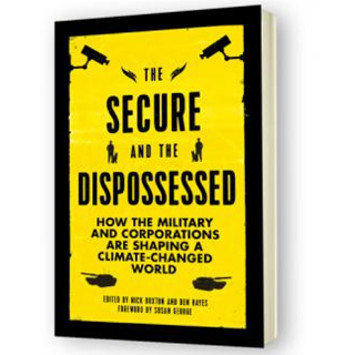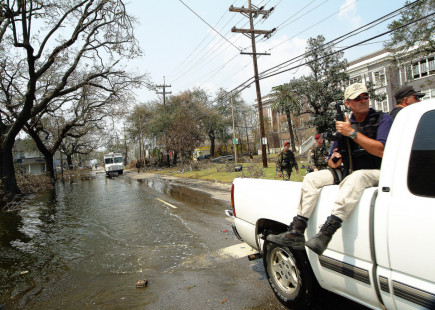Ideas into movement
Boost TNI's work
50 years. Hundreds of social struggles. Countless ideas turned into movement.
Support us as we celebrate our 50th anniversary in 2024.

Open Democracy interviewed Ben Hayes and Nick Buxton, who argue that the climate change agendas of governments and corporations have securitised and militarised environmental policies to the world's detriment.


https://www.flickr.com/photos/ussocom/
The Secure and the Dispossessed: how the military and corporations are shaping a climate-changed world, co-edited by Ben Hayes and Nick Buxton, warns that the security and military apparatus currently used by governments to manage climate change exacerbates existing problems and fuels new ones.
The book’s contributers range from experts in academia, journalism, activism, to NGOs. Naomi Klein, a leading climate change activist and author of the best-selling This Changes Everything, has described this book as essential, "if you want to understand why we can't leave it to the Pentagon to shape our response to climate change."
Recently, I spoke with Ben Hayes about where the themes of this collection sit with the ongoing refugee crisis and the 2015 UN Convention on Climate Change (COP21) in Paris, and the impact of France’s national emergency on climate demonstrations in the wake of the terrorist attacks on November 13.
The genesis of the bookIn 2008, a European strategy paper written by the High Representative for EU Common Foreign and Security Policy, Javier Solana, discussed climate change in a “threat multipliers” framework, suggesting that “climate change will begin to exacerbate global security tensions and problems,” and that “Europe should begin to protect its own supply lines and resources.” For Ben, this was a “watershed moment because it was the first time European policymakers had publicly prioritised European interests ahead of global climate justice and helping the most vulnerable countries deal with its impacts.” During this time, Ben also observed that “social policy issues of food, water, and energy were being recast as security issues,” and in particular that climate change was “being reframed as a security threat rather than a global environmental justice issue.”
After this strategy paper and the failure of the 2009 UN Climate Change Conference in Copenhagen, Ben and his colleagues started to pose the following question: “what if governments have already given up on trying to reduce current and future climate change effects and instead are preparing to respond to its impacts?”
During this period, Ben argues, corporations were beginning to spin climate change narratives, deploying terms such as ‘adaptation’, ‘mitigation’ and 'transition', in ways that safeguarded their interests. Cultivating ‘green’ marketing strategies took precedence over addressing the underlying causes of climate change. At the same time these corporate interests, Ben adds, were beginning to dovetail with the interests of governments.
Food, energy, and water: a new security paradigm?Ben suggests that “there may be nothing intrinsically wrong with the hypothesis that current global tensions may amplify security threats in the future”, but it is the response to such a framing that is important. It becomes a problem when the prescribed set of solutions fails to explore current vulnerabilities and is ill-suited to safeguarding future sustainability. This is exemplified by rich countries buying up arable land to safeguard their own food demands, with little concern for the “knock-on effects on local communities current and future food needs.”
Securitisation of migration policyA chapter in The Secure and Dispossessed by Steve Wright and April Humble looks at how global migration policies are becoming increasingly securitised: I asked Ben to provide some context. The EU, in the late 1990s, having vowed that the “displacement caused by the Balkans conflict would never happen again,” set out a policy of “fortifying the borders, deploying surveillance technologies, and soliciting the cooperation of countries of origin and transit of refugees.” It started promising EU membership for eastern European countries that acted as migration buffer zones, which prevented people from travelling towards western Europe,” and it “began introducing clauses in trade deals to help keep migration at desired levels.”
Ben warns that the establishment of asylum processing centres in countries outside Europe - a Blair government proposal which was rejected in 2004, but now “may be back on the agenda” - could, “mark the beginning of the end for refugee protection in Europe.” The tenor of European political discussions in recent months, and particularly since the attacks in Paris, suggests that European migration policy may be moving towards such “reprobate” measures.
While these securitised and militarised developments in European border policy continue apace, the fact remains that there “exists no safe, legal route to Europe for a refugee who is looking to submit an asylum claim, which is responsible for driving refugees into the hands of traffickers.”
Alarmist and dystopian climate change visions: the new governance standard?Much of today’s political discussion around climate change is forward-looking, informed by forecasting models that “disproportionally theorise dystopian scenarios,” Ben contends. These insufficiently analyse the “seeds to these potential future crises that are patently clear for us to see now—issues of racism, scarcity, inequality, and economic marginalisation.” Two key objectives of The Secure and Dispossessed are to reset discussions of climate change by exploring where “the failures in governance are today,” and to push back against the negative visions of tomorrow that are being drawn-up as a fait accompli by military, security and government elites. Ben warns that there is a “massive disconnect” between the governance of climate change and “the radical solutions that are being proposed by the scientific community or grassroots organisations.”
Moreover, he fears the “posit that the security and military apparatuses are the best points from which to address future social unrest, because this then becomes a mechanism to repress the very things we need to do now.” This was laid bare in Paris last month when all climate demonstrations were prohibited as part of France’s three-month state of emergency in the wake of the terrorist attacks. Ben contextualised this development within a pattern spanning “a number of decades,” during which authorities have systemically delegitimised climate activists by “re-branding them as anarchists and eco-terrorists, who pose a threat to national security.” Crucially, the “repression of these climate demonstrations in Paris is particularly worrying because it is precisely these protests that are needed as part of the global effort to address climate change.”
Grassroots climate movements: a sustainable global solution?While the book’s subject matter is dispiriting, Ben and Nick “didn’t wish to add to the sense of doom, nor give dystopian and catastrophic narratives a legitimacy or sense of inevitability that they do not deserve.” But they did not wish to self-censor the dangers either. The Secure and Dispossessed also illustrates some of the encouraging grassroots movements and state initiatives that are coming together to create their own solutions to climate change. The Transition Townsmovement, for example, which campaigns to reduce the energy consumption of local communities, is a “new commons” that values “the relationships that constitute a place, and the care [needed] to ensure that all aspects of a place flourish.”
Ben ends by saying that there needs to be a global movement for social justice and peace, as well as a joining-up of thinking between single-issue campaigns, “There are some interesting discussions between different climate mobilisations on the intersection of interrelated issues: what is happening in Paris, wars in the Middle-East; dependence on oil; the refugee crisis; and the biggest polluter on earth – the military.”
The Secure and the Dispossessed: how the military and corporations are shaping a climate-changed world is available at plutobooks.com
climatesecurityagenda.org is a living website accompanying the book, carrying excerpts, bonus chapters, blog posts and other resources.